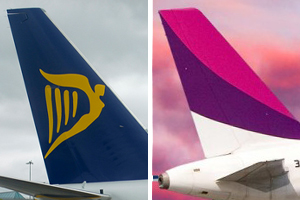Ryanair and Wizz Air, two leading budget airlines, have experienced notable changes in performance due to the ongoing Israel-Gaza conflict. Despite challenges, both airlines reported significant passenger numbers last month, demonstrating resilience amidst operational disruptions.
In February, Ryanair carried over 11 million passengers, despite cancelling 800 flights. Similarly, Wizz Air recorded an increase in passenger numbers, though its operations were affected by reallocations and postponed schedules due to mandatory aircraft inspections.
Ryanair’s February performance showed remarkable resilience, with passenger numbers reaching 11.1 million, a 5% increase compared to the previous year, even amidst socio-political tensions. The airline conducted over 63,000 flights, maintaining a load factor of 92%, consistent with the prior year’s performance. This growth contributed to an annual rolling total of 182.6 million passengers, marking a 9% increase from the previous period. Despite suspensions, Ryanair restarted flights to Tel Aviv on February 1, although these were halted again recently due to airport closures in response to the conflict.
Wizz Air’s annual rolling total passenger figure rose significantly, reaching 61.5 million. The airline planned to resume routes to Tel Aviv from Luton and five other European cities by March 1. This determination highlights Wizz Air’s strategic initiatives to adapt to fluctuating market conditions.
Both airlines have displayed a keen focus on strategic response, using periods of disruption to reassess operations and optimise resource allocation. This approach demonstrates their resilience and ability to adapt to adversities.
In response, both airlines have shown an ability to manage schedules dynamically, adjusting flight offerings in real-time to suit demand fluctuations induced by external events. These tactical adjustments are reflective of agile management practices crucial for operational success.
Passenger numbers act as a crucial indicator of an airline’s financial health. The substantial figures reported by both airlines underscore their capability to attract travelers despite external adversities. This resilience is pivotal for sustaining financial performance.
The experience from February will likely inform future strategies to safeguard operations against similar disruptions, demonstrating a commitment to learning and improvement.
The ability of Ryanair and Wizz Air to adjust operations and maintain robust passenger numbers amidst the Israel-Gaza conflict showcases their operational resilience. These strategic maneuvers illustrate their capacity to thrive in challenging environments.
Ryanair and Wizz Air have effectively showcased resilience in maintaining performance amidst geopolitical challenges. Through strategic operational adjustments, both airlines have not only sustained but also grown their passenger numbers, indicating a strong ability to adapt and thrive.
The February outcomes for both airlines highlight their commitment to stability and growth, setting a precedent for future operations amidst uncertainties.

